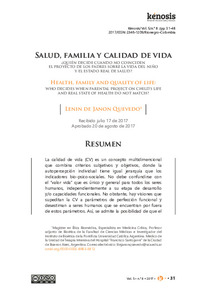Por favor, use este identificador para citar o enlazar este ítem:
https://repositorio.uca.edu.ar/handle/123456789/1512| Título: | Salud, familia y calidad de vida : ¿quién decide cuando no coinciden el proyecto de los padres sobre la vida del niño y el estado real de salud? | Autor: | De Janon Quevedo, Lenin | Palabras clave: | CALIDAD DE VIDA; DISCAPACIDAD; EUTANASIA; BIOETICA | Fecha de publicación: | 2017 | Editorial: | Universidad Católica de Oriente | Cita: | De Janon Quevedo, Lenin. (2017). Salud, familia y calidad de vida : ¿quién decide cuando no coinciden el proyecto de los padres sobre la vida del niño y el estado real de salud? [en línea]. Kénosis : revista de ciencias sociales y humanas 5(8). Disponible en: https://repositorio.uca.edu.ar/handle/123456789/1512 | Resumen: | Resumen: La calidad de vida (CV) es un concepto multidimensional que combina criterios subjetivos y objetivos, donde la autopercepción individual tiene igual jerarquía que los indicadores bio-psico-sociales. No debe confundirse con el “valor vida” que es único y general para todos los seres humanos, independientemente a su etapa de desarrollo y/o capacidades funcionales. No obstante, hay visiones que supeditan la CV a parámetros de perfección funcional y desestiman a seres humanos que se encuentran por fuera de estos parámetros. Así, se admite la posibilidad de que el poder científico, o el consenso social, determine cuál es la vida que tiene valor y bajo qué condiciones un individuo particular podrá continuar viviendo; llegando, incluso a contradecir la idea de calidad que posee esa persona, o los padres cuando se trata de niños menores. Basándose en el caso de Charlie Gard ‒de trascendencia mundial por la lucha de sus padres contra la decisión de los médicos y la justicia británica‒, este texto repasa la formación del constructo CV, las mediciones, la ética de la calidad y la forma en que se toman decisiones de salud. Asimismo, intenta responder el interrogante de ¿quién decide cuando el proyecto de la vida del hijo hecho por los padres, no coincide con la salud real del hijo? Abstract: Quality of life (QL) is a multidimensional concept that combines both subjective and objective criteria where personal self-perceptions are as important as the bio-psychosocial indexes. The QL should not be understood as the “value of life”: a single and universal worth for all human beings regardless of the phase of growth, and/or functional abilities. Nevertheless, there are some theoretical perspectives that tie the QL to criteria of functional perfection, and underappreciate the human beings who stand off those criteria. Thus, the perspectives allow the power of science, or social consensus, to decide which of the human lives are worthwhile, and under what circumstances a particular person could continue living, even in contradiction with the idea of QL that this person, or their parents when concerning the minors, has possesed. Basing on the case of Charlie Gard with its world resonance because of the battle of the parents against decisions of the doctors and British justice, this manuscript reviews the conformation, and measurement of the construct QL; as well as, the ways of health related decision making, and ethics of quality. Likewise, it attempts to respond: who does decide when the paternal on the child’s life does not correspond to thir real state of heath? |
URI: | https://repositorio.uca.edu.ar/handle/123456789/1512 | Disciplina: | BIOETICA | Derechos: | Acceso Abierto | Fuente: | Kénosis. Revista de Ciencias Sociales y Humanas 5(8), 2017 |
| Aparece en las colecciones: | Artículos |
Ficheros en este ítem:
| Fichero | Descripción | Tamaño | Formato | |
|---|---|---|---|---|
| salud-familia-calidad-vida-quevedo.pdf | 283,47 kB | Adobe PDF |  Visualizar/Abrir |
Visualizaciones de página(s)
355
comprobado en 30-abr-2024
Descarga(s)
108
comprobado en 30-abr-2024
Google ScholarTM
Ver en Google Scholar
Este ítem está sujeto a una Licencia Creative Commons

